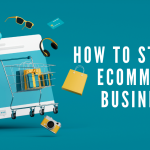Starting an ecommerce business can be an exciting and rewarding venture, offering the opportunity to reach customers globally and build a successful online brand. Here are some essential steps to help you get started:
Market Research:
Begin by identifying a niche market or product category that aligns with your interests, expertise, and target audience's needs. Conduct thorough market research to assess demand, competition, and trends within your chosen niche.
Business Plan:
Develop a comprehensive business plan outlining your goals, target market, product offerings, marketing strategy, financial projections, and operational plan. A well-defined business plan will serve as a roadmap for your ecommerce venture and help attract potential investors or lenders.
Legal Considerations:
Choose a business structure (such as sole proprietorship, partnership, LLC, etc.) and register your ecommerce business with the appropriate government authorities. Obtain necessary permits, licenses, and tax identification numbers to ensure legal compliance.
Ecommerce Platform Selection:
Select a suitable ecommerce platform to build your online store. Popular options include Shopify, WooCommerce (for WordPress), BigCommerce, and Magento. Consider factors such as ease of use, customization options, scalability, and integrations with payment gateways and shipping providers.
Product Sourcing and Inventory Management:
Determine how you will source or manufacture your products and manage inventory effectively. You may choose to dropship products, work with wholesalers or manufacturers, or create your own products. Implement inventory management systems to track stock levels, orders, and replenishments accurately.
Website Design and Development:
Design a visually appealing and user-friendly website that reflects your brand identity and showcases your products effectively. Optimize your website for mobile devices and ensure seamless navigation, fast loading times, and secure checkout processes to enhance the user experience.
Payment Gateway Setup:
Set up payment gateways to accept online payments securely. Choose reputable payment processors such as PayPal, Stripe, Square, or Authorize.Net and integrate them with your ecommerce platform. Provide multiple payment options to accommodate customer preferences.
Marketing and Promotion:
Develop a multi-channel marketing strategy to drive traffic to your ecommerce store and generate sales. Utilize digital marketing tactics such as search engine optimization (SEO), social media marketing, email marketing, content marketing, influencer partnerships, and paid advertising campaigns.
Customer Service and Support:
Prioritize excellent customer service to build trust and loyalty with your customers. Offer multiple channels for customer support, including email, live chat, and phone support. Address customer inquiries, concerns, and feedback promptly to ensure a positive shopping experience.
Analytics and Optimization:
Monitor key performance metrics and analytics to assess the effectiveness of your ecommerce business and identify areas for improvement. Utilize tools like Google Analytics to track website traffic, conversion rates, and customer behavior. Continuously optimize your website, marketing strategies, and product offerings based on data-driven insights.
By following these steps and staying proactive in your approach, you can lay a solid foundation for launching and growing a successful ecommerce business. Remember to stay adaptable and responsive to market changes, customer feedback, and emerging trends to stay competitive in the dynamic ecommerce landscape.








